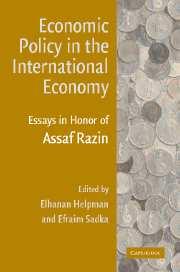Book contents
- Frontmatter
- Contents
- List of Contributors
- Preface
- Introduction
- PART ONE FINANCIAL ISSUES IN OPEN ECONOMIES: THEORY
- PART TWO FINANCIAL ISSUES IN OPEN ECONOMIES: EMPIRICS
- 5 Economic Integration, Industrial Specialization, and the Asymmetry of Macroeconomic Fluctuations
- 6 Uncovered Interest Parity in Crisis: The Interest Rate Defense in the 1990s
- 7 When Does Capital Account Liberalization Help More than It Hurts?
- 8 Sources of Inflation in Developing Countries
- PART THREE ECONOMIC GROWTH: THEORY AND EMPIRICS
- PART FOUR PUBLIC ECONOMICS
- PART FIVE POLITICAL ECONOMY
- Author Index
- Subject Index
7 - When Does Capital Account Liberalization Help More than It Hurts?
Published online by Cambridge University Press: 03 November 2009
- Frontmatter
- Contents
- List of Contributors
- Preface
- Introduction
- PART ONE FINANCIAL ISSUES IN OPEN ECONOMIES: THEORY
- PART TWO FINANCIAL ISSUES IN OPEN ECONOMIES: EMPIRICS
- 5 Economic Integration, Industrial Specialization, and the Asymmetry of Macroeconomic Fluctuations
- 6 Uncovered Interest Parity in Crisis: The Interest Rate Defense in the 1990s
- 7 When Does Capital Account Liberalization Help More than It Hurts?
- 8 Sources of Inflation in Developing Countries
- PART THREE ECONOMIC GROWTH: THEORY AND EMPIRICS
- PART FOUR PUBLIC ECONOMICS
- PART FIVE POLITICAL ECONOMY
- Author Index
- Subject Index
Summary
Introduction
The literature on the effects of capital mobility falls under two headings, reflecting the traditional divide between the two branches of international economics. While work on the effects of capital movements in models of the real economy is well advanced, due in no small part to the important contributions of Assaf Razin, the same cannot be said of research in international finance on the effects of capital account liberalization and international capital flows.
There are two explanations for the contrast, one having to do with theory, the other reflecting the limitations of existing empirics. On the theoretical side there are reasons to think that the imperfect nature of the information environment does more to complicate the effects and consequently the analysis of financial than nonfinancial transactions. Information asymmetries are endemic in financial markets. In particular, it is unrealistic to assume that agents on both sides of a financial transaction have the same information. This is especially true of international financial transactions, in whose case information flows must travel additional physical and cultural distance. It is well understood that these imperfections in the information environment are a distortion in whose presence inward foreign financial investment can be welfare reducing. But the difficulty of characterizing the information asymmetry and therefore the incidence of the distortion means that there is no consensus on precisely when and where such immiserizing effects may take place.
- Type
- Chapter
- Information
- Economic Policy in the International EconomyEssays in Honor of Assaf Razin, pp. 177 - 206Publisher: Cambridge University PressPrint publication year: 2003
- 11
- Cited by



